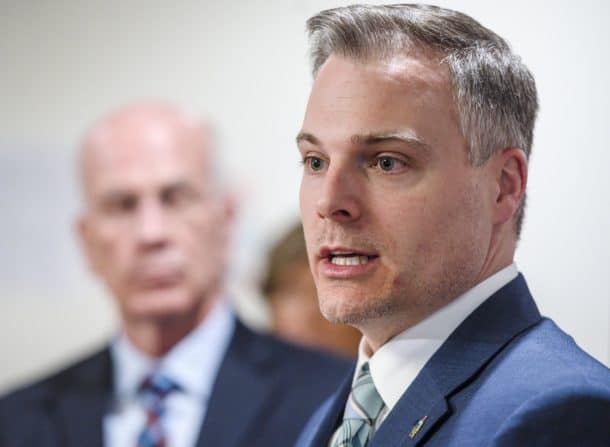By Kit Norton/VTDigger
As the spread of the coronavirus forces more Vermonters to apply for unemployment insurance, Senate lawmakers on Wednesday, March 18, began discussions on how to expand eligibility for benefits.
Legislation passed by the House last week, H.681, would ensure that employees who are forced to take leave related to COVID-19 are eligible for benefits, but would also give businesses relief for some of the costs related to paid leave. Sen. Michael Sirotkin, D-Chittenden, chair of the Senate Committee on Economic Development, said that doesn’t do enough to support Vermonters during these unusual times.
Meantime, in response to the influx of people attempting to file unemployment claims, the Department of Labor has opened an online portal to help expedite the process and, in the past 48 hours, has also increased its call center staff from about a dozen to between 25 and 30.
After years of high employment insurance rates, paying for these benefits, at least for now, is not the issue, though Sirotkin and others made sure to point out they will have to find a way to replenish the fund in some way.
Vermont’s unemployment trust fund has been built up to about $500 million and the latest recession simulations would draw it down by about 60%-70%, according to the Office of Legislative Council.
Unemployment insurance has emerged as a priority in the last several days as thousands of Vermonters have left their jobs because of the COVID-19 pandemic. With dine-in service eliminated at bars and restaurants, and a range of other closures, workers and employers are asking the state to help people who relied on their paychecks for daily needs. Others who have left their jobs to mitigate health risks or to care for children because the schools have closed have asked for state unemployment assistance as well.
Michael Harrington, acting commissioner of the Department of Labor, told lawmakers that on Tuesday alone, his department handled 500 initial claims for unemployment insurance. Before the COVID-19 outbreak, the office received 80 to 100 each day.
“We have seen obviously a very huge, or drastic, spike in the number of initial claims, which are people who are recently laid off,” Harrington said. “Now we’re at a point when we’re seeing entire industries — like the food service industry that is pretty much closing down.”
“That certainly takes it to the next level,” Harrington added.
Sirotkin said the House bill appeared “to be not as far as we could go” to relieve charges to businesses and improve eligibility.
“We really need to start thinking about people who leave the workforce because of this virus, whatever the cause is,” Sirotkin said, adding that the department should not make its main focus the worry that people are going to try to gain benefits for which they’re not eligible.
Sirotkin said the maximum weekly benefit to employees, now $513, might be too low.
The Senate committee is also planning to look at covering individuals who leave the workforce during the COVID-19 emergency to care for their children, something that is not covered in the House bill. The governor on Tuesday, March 17, ordered that child care centers close Wednesday.
Harrington told Siroktin and others that the federal government has instructed states to “loosely interpret” its guidance “to extend benefits wherever possible to those people impacted.”
Harrington said the committee could look at including independent contractors and the self-employed, or others who do not contribute to the unemployment fund, in legislation to make sure they would be eligible for benefits.
As Vermont lawmakers mull the changes, President Donald Trump is expected to sign a federal emergency law that could mitigate some of the problems faced by out-of-work Vermonters.
The U.S. Senate on Wednesday approved legislation that establishes paid emergency leave, including both 14 days of paid sick leave and up to three months of paid family and medical leave. It also includes some changes to federal unemployment insurance. The law would extend benefits to furloughed workers and suspend the employment requirement behind eligibility for the Supplemental Nutrition Assistance Program, or SNAP.
The Vermont Senate committee and Harrington were due to continue the discussion Thursday.

Michael Harrington, acting commissioner of the Vermont Department of Labor, speaks at a press conference with U.S. Rep. Peter Welch in Barre on Monday, March 16, 2020.



